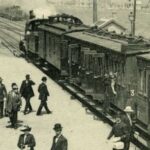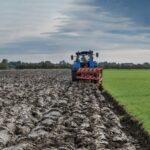The Quetelet Center not only shares research databases, but also its expertise. The knowledge gained in the SOS Antwerp project on citizen science and crowdsourcing now also supports other initiatives, such as War Sources from Archiefpunt.
Flanders has drastically changed its appearance over the past 250 years. AI-based research by INBO shows how heathland and dunes almost disappeared, fields gave way to grassland, and built-up areas grew to one-fifth of the territory. Thanks to historical maps and databases such as LOKSTAT, researchers were able to make precise comparisons and gain a clear picture of the evolution of our landscape.
The S.O.S. Antwerp database has been launched! It contains information on more than 480,000 deaths in Antwerp between 1820 and 1946 and was made possible thanks to 761 volunteers, who, under the guidance of the Quetelet Center unlocked the cause-of-death registers for both academic researchers and the wider public.
For centuries, large landowners determined how land was managed and who was allowed to live off it. In a recently defended dissertation, Sander Berghmans (UGent) reveals the economic strategies they pursued and how these choices shaped local economies and social relations. The Quetelet Center provided historical map material for this research.
The International database on Democratic Electoral Systems (DES) has recently been expanded with election data from the years 1919-1945, including data on Belgium. The database provides new insights into the impact of electoral systems on democratic stability and party fragmentation. For the addition and analysis of the Belgian data, researchers utilized the cartographic tools of LOKSTAT.
Lordships were a key form of governance in the Low Countries during the Middle Ages and early modern period. However, the reasons for their varying distribution across different regions remain insufficiently understood. A comparative study conducted by biologist Margreet Brandsma and historian Jim Van der Meulen (UGent), partly based on LOKSTAT data, demonstrates that soil fertility and proximity to trade routes played a crucial role in their presence and distribution.
Did you know that small water pits once formed the backbone of a thriving flax industry in the Land of Dendermonde and the Land of Waas? These so-called flax retting pits, now almost forgotten, played a crucial role in textile production and the regional landscape. Lies Vervaet unravels their hidden history and, with the help of sources such as LOKSTAT, demonstrates how they can still be valuable today for nature, water management, and heritage conservation.
Despite advances in healthcare, persistent regional differences in mortality rates remain. The latest issue of the journal Espace – Populations – Sociétés explores how causes of death vary across time and space, with attention to social, environmental, and behavioral factors. It features contributions from several researchers at the Quetelet Center, who present their latest research findings.
The construction sector in Brussels underwent a major transformation between 1830 and 1970. While industrialization and urbanization led to larger enterprises and market concentration, the craftsmanship of small, flexible construction firms endured. Matthijs Degraeve (VUB) examined how this modernization took place in Brussels, using data from sources such as POPPKAD and LOKSTAT.
Railways played a crucial role in Belgium’s spatial development. Ingrid Schepers (UA) researched how government transport policies, urbanization, and commuting flows influenced each other and shaped the country. Her study, partly based on LOKSTAT, shows that it was not only low train fares that directed population movements, but that economic structures were at least as influential as the infrastructure itself.
Ghent is a major landowner. Especially beyond its borders, the city owns a significant amount of agricultural land. Today, this amounts to around 1,800 hectares, but at one time, Ghent owned more than 5,000 hectares of fields, meadows, and forests. What does a city do with so much rural land? The exhibition Ghent’s Lands, to which POPPKAD contributed, explores the history of this land ownership and its importance to society.
Economic inequality between regions is a universal phenomenon. In her recently defended PhD, Ophelia Ongena (Ghent University) sheds new light on the origins and evolution of regional economic policy in Belgium since the 1950s. She demonstrates how governments, despite good intentions, often navigated between political tensions and complex divisions of power. For her research, she made use of LOKSTAT, among other sources.












